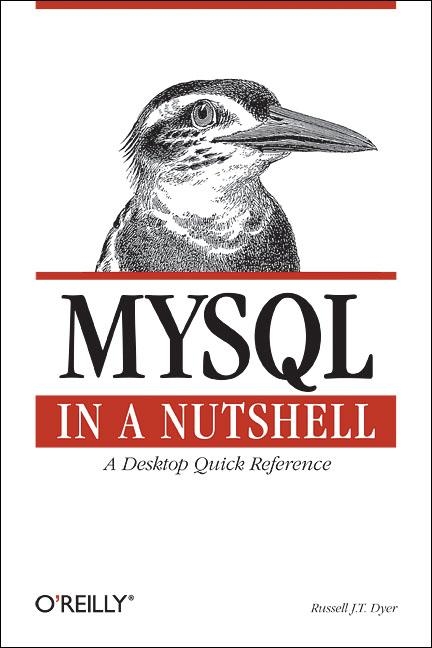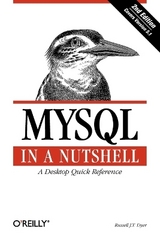
MySQL in a Nutshell
O'Reilly Media (Verlag)
978-0-596-00789-8 (ISBN)
- Titel erscheint in neuer Auflage
- Artikel merken
MySQL is the world's most popular open source database. MySQL is designed for speed, power, and flexibility in mission-critical, heavy-use environments and modest applications as well. It's also surprisingly rich in features. If you're a database administrator or programmer you probably love the myriad of things MySQL can do, but sometimes wish there wasn't such a myriad of things to remember. With MySQL in a Nutshell by your keyboard, you can drill down into the full depth of MySQL's capabilities quickly and easily. MySQL in a Nutshell is the indispensable desktop reference to all MySQL functions. Programming language APIs for PHP, Perl, and C are covered, as well as all the popular MySQL utilities. This invaluable resource clearly documents the details that experienced users need to take full advantage of this powerful database management system. Better yet, this wealth of information is packed into the concise, comprehensive, and extraordinarily easy-to-use format for which the in a Nutshell guides are renowned.
In addition to providing a thorough reference to MySQL statements and functions, the administrative utilities, and the most popular APIs, MySQL in a Nutshell includes several tutorial chapters to help newcomers get started. Moreover, each chapter covering an API begins with a brief tutorial so that, regardless of your level of experience in any given area, you will be able to understand and master unfamiliar territory. MySQL in a Nutshell distills all the vital MySQL details you need on a daily basis into one convenient, well-organized book. It will save you hundreds of hours of tedious research or trial and error and put the facts you need to truly tap MySQL's capabilities at your fingertips.
Russell Dyer is a Perl programmer, MySQL developer, and web designer living and working on a consulting basis in New Orleans. He is also an adjunct instructor at a local college where he teaches Linux and other open source software. He welcomes reader responses to his articles.
Preface; 1. Introduction to MySQL; The Value of MySQL; The MySQL Package; Licensing; Mailing Lists; Books and Other Publications; 2. Installing MySQL; Choosing a Distribution; Unix Source Distributions; Unix Binary Distributions; Linux RPM Distributions; Macintosh OS X Distributions; Novell NetWare Distributions; Windows Distributions; Postinstallation; 3. MySQL Basics; The MySQL Client; Creating a Database and Tables; Show Me Inserting Data; Selecting Data; Ordering, Limiting, and Grouping; Analyzing and Manipulating Data; Changing Data; Deleting Data; Searching Data; Importing Data in Bulk Command-Line Interface; Conclusion; 4. SQL Statements; Statements Grouped by Type; Statements and Clauses in Alphabetical Order; Alter Database; Alter Table; Alter View; Analyze Table; Backup Table; Cache Index; Change Master To Check Table; Checksum Table Commit; Create Database; Create Index; Create Table; Create View; Delete; Describe; Do; Drop Database; Drop Index; Drop Table; Drop User; Drop View; Explain; Flush; Grant; Handler; Insert; Join; Kill; Load Data From Master; Load Data Infile; Load Index Into Cache; Load Table...From Master; Lock Tables; Optimize Table; Purge Master Logs; Rename Table; Repair Table; Replace; Reset; Reset Master; Reset Slave; Restore Table; Revoke Rollback; Rollback To Savepoint; Savepoint Select; Set; Set Password; Set Sql_Log_Bin; Set Transaction; Show Binlog Events; Show Character Set; Show Collation; Show Columns; Show Create Database; Show Create Table; Show Create View; Show Databases; Show Engines; Show Errors; Show Grants; Show Index; Show Innodb Status; Show Logs; Show Master Logs; Show Master Status; Show Privileges; Show Processlist; Show Slave Hosts; Show Slave Status; Show Status; Show Table Status; Show Tables; Show Variables; Show Warnings; Start Slave; Start Transaction; Stop Slave; Truncate Table; Union; Unlock Tables; Use; 5. String functions string functions grouped by type string functions in alphabetical order; aes_decrypt; aes_encrypt; ascii; bin; binary; bit_length; char; char_length; character_length; compress; concat; concat_ws; conv; decode; des_decrypt; des_encrypt; elt; encode; encrypt; export_set; field; find_in_set; hex; inet_aton; inet_ntoa; insert; instr; lcase; left; length; load_file; locate; lower; lpad; ltrim; make_set; match; against; md5; mid; oct; octet_length; old_password; ord; password; position; quote; repeat; replace; reverse; right; rpad; rtrim; sha; sha1; soundex; space; strcmp; substring; substring_index; trim; ucase; uncompress; uncompressed_length; unhex; upper; 6. date and time functions date and time functions grouped by type determining the date and time extracting and formatting the date and time calculating and modifying the date and time date and time functions in alphabetical order adddate; addtime; convert_tz; curdate; current_date; current_time; current_timestamp; curtime; date; date_add; date_format; date_sub; datediff; day; dayname; dayofmonth; dayofweek; dayofyear; extract; from_days; from_unixtime; get_format; hour; last_day; localtime; localtimestamp; makedate; maketime; microsecond; minute; month; monthname; now; period_add; period_diff; quarter; sec_to_time; second; str_to_date; subdate; subtime; sysdate; time; timediff; timestamp; timestampdiff; timestampadd; time_format; time_to_sec; to_days; unix_timestamp; utc_date; utc_time; utc_timestamp; week; weekday; weekofyear; year; yearweek; 7. mathematical and aggregate functions functions in alphabetical order abs; acos; asin; atan; atan2; avg; bit_and; bit_or; bit_xor; ceil; ceiling; cos; cot; count; crc32; degrees; exp; floor; format; greatest; group_concat; least; ln; log; log2; log10; max; min; mod; pi; pow; power; radians; rand; round; sign; sin; sqrt; std; stddev; sum; tan; truncate; variance; 8. flow control functions functions in alphabetical order case; if; ifnull; nullif; 9. miscellaneous functions functions in alphabetical order analyse; benchmark; bit_count; cast; charset; coalesce; coercibility; collation; connection_id; convert; current_user; database; found_rows; get_lock; interval; is_free_lock; is_used_lock; isnull; last_insert_id; master_pos_wait; release_lock; session_user; system_user; user; uuid; version; 10. MySQL Server and Client mysql mysqld mysqld_multi mysqld_safe; 11. Command-Line Utilities comp_err isamchk make_binary_distribution msql2mysql my_print_defaults; myisamchk myisamlog myisampack mysqlaccess mysqladmin; mysqlbinlog mysqlbug mysqlcheck mysqldump mysqldumpslow; mysqlhotcopy mysqlimport mysqlshow perror 12. Perl API; Using Perl DBI with MySQL Perl DBI Method and Function Reference; available_drivers; begin_work; bind_col; bind_columns; bind_param; bind_param_array; bind_param_inout; can; clone; column_info; commit; connect; connect_cached; data_sources; disconnect; do; dump_results; err; errstr; execute; execute_array; execute_for_fetch; fetch; fetchall_arrayref; fetchall_hashref; fetchrow_array; fetchrow_arrayref; fetchrow_hashref; finish; foreign_key_info; func; get_info; nstalled_versions; last_insert_id; looks_like_number; neat; neat_list; parse_dsn; parse_trace_flag; parse_trace_flags; ping; prepare; prepare_cached; primary_key; primary_key_info; quote; quote_identifier; rollback; rows; selectall_arrayref; selectall_hashref; selectcol_arrayref; selectrow_array; selectrow_arrayref; selectrow_hashref; set_err; state; table_info; table_info_all; tables; trace; trace_msg; type_info; type_info_all; Attributes for Handles; 13. PHP API Using PHP with MySQL PHP MySQL Functions in Alphabetical Order mysql_affected_rows; mysql_change_user; mysql_client_encoding; mysql_close; mysql_connect; mysql_create_db; mysql_data_seek; mysql_db_name; mysql_db_query; mysql_drop_db; mysql_errno; mysql_error; mysql_escape_string; mysql_fetch_array; mysql_fetch_assoc; mysql_fetch_field; mysql_fetch_lengths; mysql_fetch_object; mysql_fetch_row; mysql_field_flags; mysql_field_len; mysql_field_name; mysql_field_seek; mysql_field_table; mysql_field_type; mysql_free_result; mysql_get_client_info; mysql_get_host_info; mysql_get_proto_info; mysql_get_server_info; mysql_info; mysql_insert_id; mysql_list_dbs; mysql_list_fields; mysql_list_processes; mysql_list_tables; mysql_num_fields; mysql_num_rows; mysql_pconnect; mysql_ping; mysql_query; mysql_real_escape_string; mysql_result; mysql_select_db; mysql_stat; mysql_tablename; mysql_thread_id; mysql_unbuffered_query; 14. C API Using C with MySQL; Functions in Alphabetical Order mysql_affected_rows; mysql_autocommit; mysql_change_user; mysql_character_set_name; mysql_close; mysql_commit; mysql_connect; mysql_create_db; mysql_data_seek; mysql_debug; mysql_drop_db; mysql_dump_debug_info; mysql_eof; mysql_errno; mysql_error; mysql_escape_string; mysql_fetch_field; mysql_fetch_field_direct; mysql_fetch_fields; mysql_fetch_lengths; mysql_fetch_row; mysql_field_count; mysql_field_seek; mysql_field_tell; mysql_free_result; mysql_get_client_info; mysql_get_client_version; mysql_get_host_info; mysql_get_proto_info; mysql_get_server_info; mysql_get_server_version; mysql_info; mysql_init; mysql_insert_id; mysql_kill; mysql_list_dbs; mysql_list_fields; mysql_list_processes; mysql_list_tables; mysql_more_results; mysql_next_result; mysql_num_fields; mysql_num_rows; mysql_options; mysql_ping; mysql_query; mysql_real_connect; mysql_real_escape_string; mysql_real_query; mysql_reload; mysql_rollback; mysql_row_seek; mysql_row_tell; mysql_select_db; mysql_set_server_option; mysql_shutdown; mysql_sqlstate; mysql_stat; mysql_store_result; mysql_thread_id; mysql_thread_safe; mysql_use_result; mysql_warning_count; C API Datatypes; A. Datatypes; B. Operators; C. Environment Variables; Index
| Erscheint lt. Verlag | 7.6.2005 |
|---|---|
| Verlagsort | Sebastopol |
| Sprache | englisch |
| Maße | 153 x 229 mm |
| Einbandart | kartoniert |
| Themenwelt | Mathematik / Informatik ► Informatik ► Betriebssysteme / Server |
| Mathematik / Informatik ► Informatik ► Datenbanken | |
| ISBN-10 | 0-596-00789-2 / 0596007892 |
| ISBN-13 | 978-0-596-00789-8 / 9780596007898 |
| Zustand | Neuware |
| Informationen gemäß Produktsicherheitsverordnung (GPSR) | |
| Haben Sie eine Frage zum Produkt? |
aus dem Bereich



